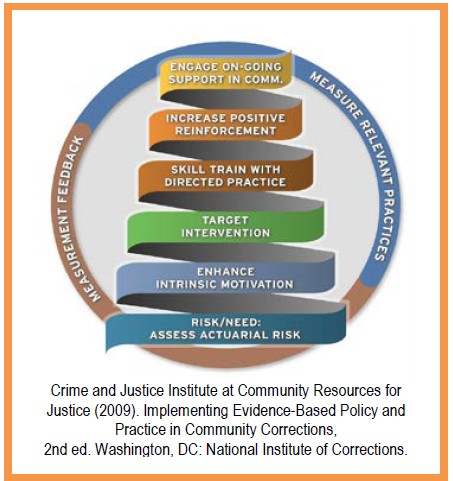Online Training Resources:
The National Institute of Corrections:
- Free Registration for Trainings
- The online catalog features interactive web trainings that the following topics: Administrative Professions, Communication, Computer Skills, Corrections Topics, Personal Development, Ethics, Finance, Human Resources, Leadership, Management, Mentoring, Diversity, Writing and Grammar, Project Management, Safety and Wellness, Team Building, Training, and Working with Difficult People.
NICIC Class Recommendations
Notes: *All descriptions and Information from NIC's Website
- Motivational Interviewing (MI): Overview
This course provides an overview of Motivational Interviewing (MI). By using specific techniques and applying MI, corrections professionals can help increase offenders’ motivation to make changes in their lives that will reduce their likelihood of reoffending. This course is a self-study orientation course and resource for corrections professionals as well as a classroom aid for supervisors and trainers. Estimated duration: 1 hour
- NIC Frontline Learning Center
The Frontline Learning Center is available to correctional officers, detention officers, probation and parole officers, re-entry specialists, correctional health professionals, and other correctional line staff wishing to take NIC e-courses. Learn more by reading the Frontline article in NIC's National Jail Exchange.
- NIC PREA Learning Center
The Prison Rape Elimination Act (PREA) was signed into law September 4, 2003 and supports the elimination, reduction and prevention of sexual assault within the corrections systems. The PREA learning Center provides access to all corrections professionals wishing to complete the e-course, Your Role: Responding to Sexual Abuse.
- The Pew Center
Video: Reducing Recidivism 5 minutes. States spend $50 billion a year on corrections, yet more than four out of ten prisoners wind up back behind bars within three years of release. States can break this cycle of recidivism, and save money, by implementing evidence-based programs and policies including risk assessment, fiscal incentives and swift and certain sanctions.
Evidenced Based
- Evidence Based Decision Making Framework:
- Evidence Based Policymaking:
2014 PEW-MacArthur: Evidence-Based Policymaking: A Guide for Effective Government.
*The report presents five key components to implementing evidence-based policymaking:
- Program Assessment A guide for Identifying what works in your state or locality Systematically reviewing available evidence on the effectiveness of public programs.
- Budget Development A Guide to Evidence-Based Budget Development. Incorporating evidence of program effectiveness into budget and policy decisions, giving funding priority to programs that deliver a high return on investment of public funds.
- Implementation Oversight A guide to effective program delivery Ensuring that programs are effectively delivered and are faithful to their intended design.
- Outcome monitoring The role of Outcome Monitoring in EBP Policymaking Routinely measuring and reporting outcome data to determine whether interventions are achieving desired results.
- Targeted evaluation A policymaker's guide to building evaluation capacity Conducting rigorous evaluations of new and untested programs to ensure that they warrant continued funding
Evidence Based Programming Implementation
- Pretrial:
- Post Conviction:
The National Institute of Corrections: EBP Resource Center
Implementing Evidence-Based Policy and Practice in Community Corrections, 2nd Edition
Implementing EBP in CC: Quality Assurance Manual
Tools of the Trade: a guide to incorporating science into practice
2011 CGS Justice Center: A Ten-Step Guide to Transforming Probation Departments to Reduce Recidivism
- Skill Development:
Collaboration Resources
State Justice Institute
